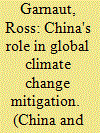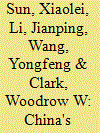| Srl | Item |
| 1 |
ID:
134359


|
|
|
|
|
| Summary/Abstract |
China contributed a majority of the growth in global greenhouse gas emissions in the first 11 years of this century. The trajectory of emissions has changed radically since then, as China has implemented its Cancun 2010 commitment to reduce the 2005 emissions intensity of economic activity by 40–45 percent by 2020. The change in trajectory has been reinforced by China's new model of economic growth, with its greater emphasis on equity in income distribution, consumption and services. The large-scale deployment of low emissions technology in China is lowering the cost of transition to a low carbon economy all over the world. China's new emissions trajectory improves the opportunity for the international community to meet the 2°C climate target. It is essential that the changes in China are brought to account in shaping global mitigation ambition.
|
|
|
|
|
|
|
|
|
|
|
|
|
|
|
|
| 2 |
ID:
127295


|
|
|
|
|
| Publication |
2014.
|
| Summary/Abstract |
Sovereign Wealth Funds (SWFs) are state-owned investment funds that invest in real and financial assets. Since the global financial crisis in 2008, SWFs' investments have resulted in national security concerns of host countries because SWFs continue to expand rapidly and have become increasingly active in real-time strategic transactions. Given this background, China, which has the biggest SWF in the world, is facing severe challenges of energy resources shortages while its plan is to accomplish social and economic development goals. Energy security is a key driving force of the energy investment policy of China's SWFs. This makes the SWF investments more complicated and more politically sensitive. The combination of sovereign rights and the strategic importance of energy also makes geopolitics more complicated and brings more uncertainty to SWF investments. This article explores the relationship between energy security and energy investments of China's SWFs. It is recognised that the energy investment of SWFs must follow a sustainable path to coordinate energy security, economic growth, return on investment and national security concerns. Government policymakers are urged to balance the financial and political returns on SWFs against potential negative effects. The conclusion presents insights for policymakers, energy scholars and SWF researchers.
|
|
|
|
|
|
|
|
|
|
|
|
|
|
|
|